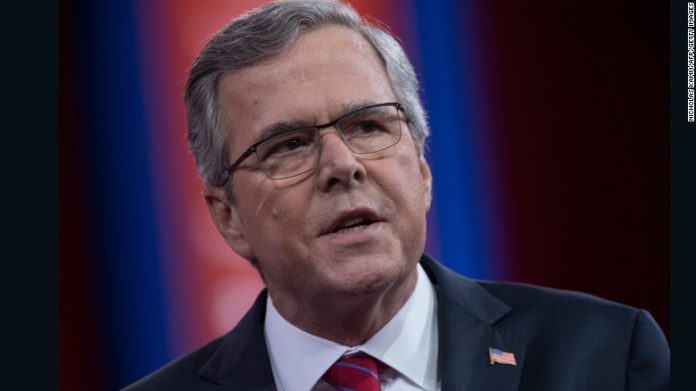
There’s going to be a new lecturer at Harvard University this fall – Jeb Bush, former two-term Florida governor and unsuccessful candidate for the Republican presidential nomination.
But while he will be a visiting fellow at Harvard Kennedy School’s Taubman Center for State and Local Government, he won’t be instructing on politics. Bush will instead be teaching about education.
Harvard announced Tuesday that Bush will teach in the Program on Education Policy and Governance and deliver the Edwin L. Godkin Lecture on Sept. 29, 2016, an annual event hosted by the Institute of Politics’ John F. Kennedy Jr. Forum. Bush won’t be teaching an actual course but will instead participate during “a number of multi-day visits” to Harvard “as a guest instructor and presenter, including lecturing in the course ‘The Political Economy of the School,’ ” the announcement said.
Bush was considered the front-runner for the 2016 GOP presidential nomination last year, but quit in February amid the ascendancy of Donald Trump, who made Bush a special target on the campaign trail by saying that the former governor had “low energy.”
Bush had hoped to make education reform a central issue in the campaign, building on his pioneering work as a corporate school reformer while he was governor of Florida from 1999 to 2007 and later on as head of an education foundation. After suspending his campaign, Bush remained absent from the public until this month, when he did a funny cameo appearance on the Emmy Awards program, portraying the driver of a limousine carrying “Veep” President Selina Meyer, portrayed by Julia Louis-Dreyfus. During a skit in which host Jimmy Kimmel tried to hitch a ride to the Emmys, Bush said: “I’m in between jobs right now. You know you can make $12 an hour driving for Uber?”
Bush as much as anyone led the reform movement that centered on using standardized test scores as the chief metric of “accountability” for schools and pushing for the privatization of public education. A strong supporter of the Common Core State Standards, Bush created a “Florida Formula” that became a model for other states, and even President Barack Obama praised him as a “champion” of education. When Bush left office in 2007, he formed the Foundation for Excellence in Education, which promotes school reform and hosts a national school reform “summit” every year that brings together like-minded reformers from the worlds of business and policymaking.
But in recent years, Bush’s view of school reform has run into rough waters. The test-based accountability system that he built in Florida essentially collapsed as the integrity of the test scores were questioned repeatedly by school districts, and as a movement against corporate school reform has gained significant traction across the country.
Critics accused him of wanting to privatize the entire public education system and noted that he doesn’t call public school districts public school districts, but rather says that the United States has “over 13,000 government-run monopolies run by unions.” (He doesn’t mention that some districts don’t have unions or that unions can’t win a contract agreement without politicians agreeing.)
The course to which Bush will contribute at Harvard is taught by Paul E. Peterson, a professor and director of the Program on Education Policy and Governance; and John White, Louisiana’s state superintendent for education. Peterson and White have been supporters of the kind of school reform that Bush made famous.
That’s not all Bush will do at Harvard. The announcement says he will also participate in a “colloquia series on education policy and research, and in student study groups led by faculty members,” during which he will talk about his two terms as Florida governor and his K-12 education reform foundation. And he will participate in October in the Harvard Graduate School of Education’s Askwith Forum, a yearly series of public lectures whose topics are initiated by faculty, students and alumni, and which aim to address the highest-priority challenges facing education.
Bush is a big proponent of “school choice,” famously saying in 2012 that shopping for a school should be like shopping for milk. He said, to be exact:
“Everywhere in our lives, we get the chance to choose. Go down any supermarket aisle – you’ll find an incredible selection of milk. You can get whole milk, 2 percent milk, low-fat milk or skim milk. Organic milk, and milk with extra Vitamin D. There’s flavored milk – chocolate, strawberry or vanilla – and it doesn’t even taste like milk. They even make milk for people who can’t drink milk. Shouldn’t parents have that kind of choice in schools?”
When Bush has talked about the virtues of charter schools in Florida, he hasn’t mentioned that Florida charter schools don’t do any better than traditional public schools on math and reading test scores, or that Florida’s charter sector has been marred by numerous closures of charters – some even during the school year – and repeated financial mismanagement scandals. In fact, in 2011, the Miami Herald ran a special report called “Cashing In On Kids – Florida’s Charter Schools: big money, little oversight” that reviewed the state’s 15-year charter expansion and found that these schools had “turned into one of the region’s fastest-growing industries, backed by real-estate developers and promoted by politicians” with little oversight.
(c) 2016, The Washington Post · Valerie Strauss

